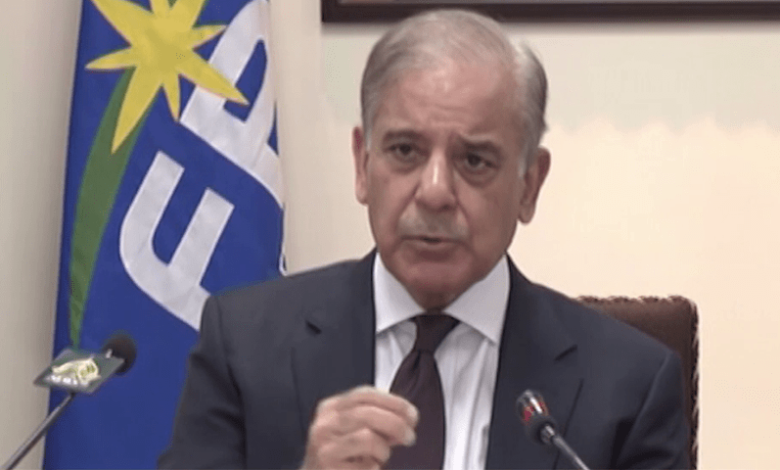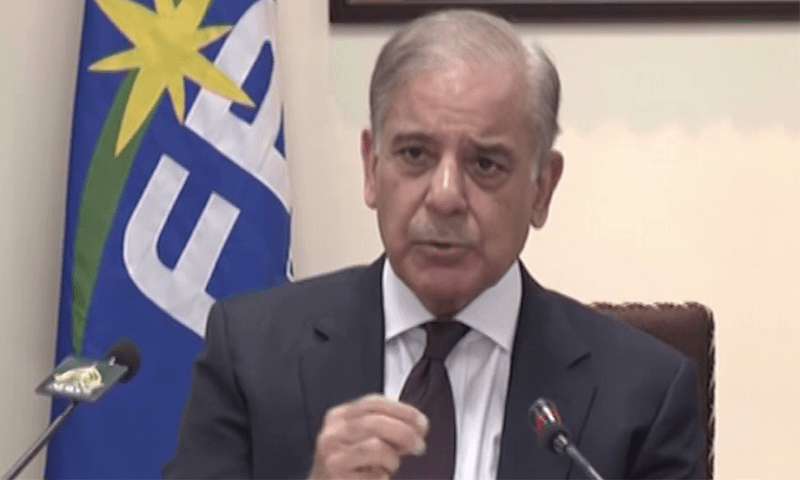‘Now is the time’: Must ensure new IMF programme is the last one, says PM Shehbaz – Business


Prime Minister Shehbaz Sharif on Saturday said that Pakistan needed to embark on a “long and difficult journey” to prevent knocking on the doors of the International Monetary Fund (IMF) again.
“If we want to get rid of loans, we need to consider this IMF programme as the final one,” he said.
In the wee hours of Saturday, the international lender announced that Pakistan and the Fund had reached a three-year $7 billion aid package deal, giving much-needed respite to the nation.
The programme, which needs to be approved by the IMF’s Executive Board, should enable Pakistan to “cement macroeconomic stability and create conditions for stronger, more inclusive and resilient growth,” it said in a statement.
Coming to Pakistan in the form of loans, the latest bailout follows a commitment by the government to implement reforms, including a major effort to broaden the country’s tax base.
Addressing a meeting at the headquarters of the Federal Board of Revenue (FBR) today, the premier congratulated Finance Minister Muhammad Aurangzeb and other cabinet members for clinching the programme.
“This cabinet has done a great deal of work to make sure we achieved this goal,” he said. “But, we need to pursue a long and difficult journey to augment our macroeconomic numbers. We will have to make sacrifices.
“Now is the time, it is our responsibility to act speedily and work tirelessly. Only then will this be the final IMF programme in this country,” PM Shehbaz said.
He stated that putting extra taxes on taxpayers was like a “premium for those who don’t pay [taxes] and it’s a penalty for honest taxpayers”. He added that the government needed to adopt new strategies and employ advanced technology used by tax authorities throughout the world.
The PM expressed that it brought him pain whenever Pakistan had to approach the World Bank and other institutions for loans. “We collect billions, trillions and we’re still going to the World Bank and others. A country cannot run like this.”
“With the finance minister and the FBR chairman as my witness, this is the last time I’m saying it: whatever you need in the public interest to collect the last penny, which is our due right, I will spend whatever amount of money to acquire the gadgetries required for this purpose. It is our national interest and our duty,” he affirmed.
The prime minister further emphasised that now was the time for a “paradigm shift”.
“We need to tighten our belts and serve the public,” he said. “For the first and last time, we need to act in the national interest. If there’s any honest mistake, we’ll rectify that. I will quit if I need to, but I will not come under any pressure, I want that to be loud and clear.”
Earlier, Geo News quoted the finance minister as saying that the new IMF deal would aid Pakistan in achieving macroeconomic stability.
Under the programme “we need to ensure structural reforms and bring self-sustainability in areas of public finance, energy, and state-owned institutions”, he said.
IMF statement
Faced with chronic mismanagement, Pakistan’s economy has found itself on the brink, challenged by the Covid-19 pandemic, the effects of the war in Ukraine and supply difficulties that fuelled inflation, as well as record flooding that affected a third of the country in 2022.
With its foreign currency reserves dwindling, Pakistan found itself in a debt crisis and was forced to turn to the IMF, obtaining its first emergency loan in the summer of 2023.
The IMF statement issued earlier today quoted the Fund’s mission chief to Pakistan, Nathan Proter, as saying that the new programme “aims to capitalise on the hard-won macroeconomic stability achieved over the past year by furthering efforts to strengthen public finances, reduce inflation, rebuild external buffers and remove economic distortions to spur private sector-led growth”.
“In this regard, the authorities plan to increase tax revenues through measures of 1.5 per cent of GDP in FY25 and 3 per cent of GDP over the programme,” the lender said. The increase in revenue collections will be achieved through “simpler and fairer direct and indirect taxation, including by bringing net income from the retail, export, and agriculture sectors properly into the tax system”.
The statement added that federal and provincial governments have agreed to rebalance spending activities in line with the 18th Constitution Amendment by signing a ‘National Fiscal Pact’. Under the agreement, subjects including education spending, health, social protection, and regional public infrastructure investment will be devolved to provinces.
The provinces have already committed to “fully harmonising their Agriculture Income Tax regimes through legislative changes” with the federal and corporate income tax regimes. The move will be implemented from Jan 1, 2025.
The government will also improve the power sector’s viability and minimise its losses through timely tariff adjustment, reforms, and refraining from further unnecessary expansion of generation capacity.
“The authorities remain committed to undertaking targeted subsidy reforms and replace cross-subsidies to households with direct and targeted BISP support.”
The authorities will improve SOE operations and management as well as privatisation, in which the most profitable entities will be prioritised.
The government is also working towards “phasing out” incentives to Special Economic Zones, agricultural support prices and related subsidies, while refraining from new regulatory or tax-based incentives, or any guaranteed return “that could distort the investment landscape. “The authorities have also committed to advance anti-corruption as well as governance and transparency reforms, and gradually liberalise trade policy,” the statement concluded.
Source link